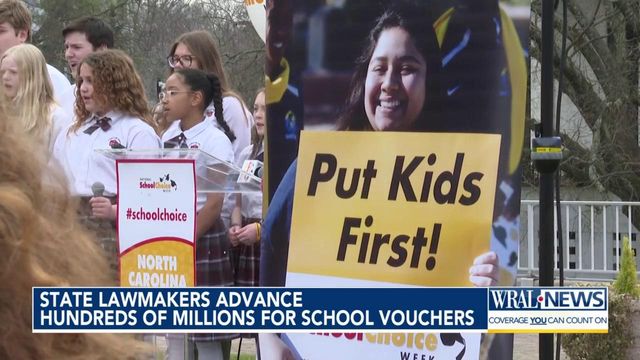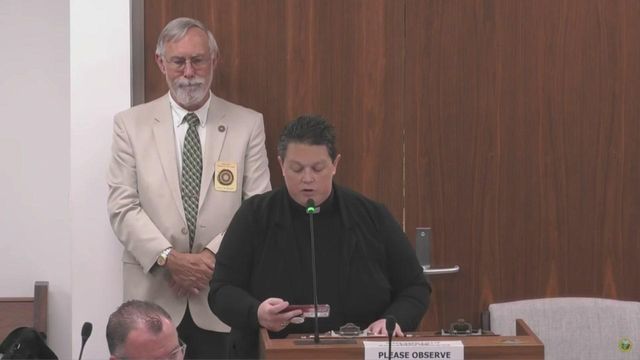$248M more for private school vouchers? Committee favors funding final 54,000 applicants left out
A legislative committee is recommending a bill that would about double funding — to well more than $500 million next year — for the state’s program that writes checks to families who wish to send their children to a private school instead of a public school.
The bill, as changed Wednesday by the Senate Appropriations Committee, would ensure all children who applied for the program can attend the school of their choice, according to proponents. But the bill’s opponents argue it siphons money away from the public schools that more families are able to attend and that are not adequately resourced.
“We’re talking about a few children where parents want to send them to private schools because they believe the public schools are failing,” said Sen. Gladys Robinson, D-Guilford, who opposed the bill. “We are failing them,” she said, by not providing them with the resources they need and doing things like putting money into private school tuition. “This is an indication of that.”
Bill sponsor Sen. Michael Lee, R-New Hanover, said the voucher program provides an immediate solution for a family. He and his wife pulled their youngest son out of public school after they felt it wasn’t serving him in the way that he needed “for various reasons” and that his son was able to be more successful at a private school. His son’s success couldn’t have happened unless he had the money to send him elsewhere, Lee said.
“I’m not saying this is going to fix all those problems [with public schools],” Lee said. “It’s just going to help a child like my son.”
Called Opportunity Scholarships, the voucher program is set to be short on funding next year by more than $200 million. Next year is the first year that families of any income and families of current private school students have been allowed to receive a voucher, resulting in about 72,000 new applicants for the program that already enrolled more than 32,000 students. The voucher covers at least $3,000 for families and up to more than $7,000 for the lowest-income families, unless actual tuition is lower than that.
The new version of House Bill 823 would increase funding for private school vouchers by $248 million next year, a one-time sum. The year after that, the bill would add $215.5 million to previously approved funding totals. The increase for next year would be on top of the $293.5 million already appropriated for next year from the Opportunity Scholarship fund and from two other funding sources — meaning, funding for Opportunity Scholarships would be $541.5 million next year. The state spends more than $11 billion on public schools, and counties spend another more than $3 billion on public schools.
It’s unclear how many of the students who applied for an Opportunity Scholarship already attend a private school, because the state Educational Assistance Authority doesn’t ask for that information when students apply.
Senators debated the definition of “welfare” and whether public money for wealthy families to attend private schools was necessary. They also touched on the state Constitution’s promise of a free education to all — something all said they supported but has been a touchy subject mired in decades of legal action over whether schools are adequately resourced.
The wealthiest of families don’t need it, said Sen. Natasha Marcus, D-Mecklenburg. “They’re already paying their private school tuition and can afford it quite well. I think it’s disingenuous to say they are waiting [for this bill].”
Lee argued that wealthy families contribute more in taxes than they’d receive from a voucher and that most families who aren’t set to receive a voucher are middle class.
An Opportunity Scholarship for child whose parents both earn $55,000 per year “I don’t think is giving money to the wealthy,” Lee said.
About one-fifth of applicants were from families in the highest-income tier. That means a family of four earning more than $259,740. About two-fifths were from families with incomes in the tier below — between $115,400 and $159,740 for a family of four. But none of those families are set to receive a voucher next year. Very few families in the second-lowest income tier — between $57,720 and $115,440 for a family of four — are set to receive a voucher. All families in the lowest-income tier — $57,720 for a family of four — are set to receive a voucher, and all families who already have a voucher are set to receive one again.
The bill, House Bill 823, would also provide $24.7 million toward the North Carolina Personal Education Student Accounts for Children with Disabilities Program. More than 2,000 families who applied for that program aren’t sent to receive a voucher next year.
The bill will need to be heard by more groups, including the full Senate and House, before it can be sent to Gov. Roy Cooper’s desk for signing into law. Cooper opposes expanding Opportunity Scholarship funding, and a supermajority of the legislature would need to override a likely veto from Cooper.
Cooper has traveled the state for the past year, going to schools and advocating for more public school funding and a pause on increases to private school vouchers.
The state is expected to have a $1 billion surplus next year, and Cooper is pushing for an 8.5% raise for teachers and a ballot referendum for a $2.5 billion school construction bond.
Schools are short billions of dollars toward school construction, something one senator said was a reason to support the voucher program.
“We can’t keep up with school construction,” Republican Sen. Jim Burgin said of fast-growing Harnett County.
If schools can’t pay for their current or existing buildings, Burgin said, private schools can enroll excess students. He said Harnett County is short $400 million on school construction.
By state law, the state funds education and counties fund buildings, although counties spend more than $3 billion on education, as well, via local property taxes. They spend less than that on buildings.











